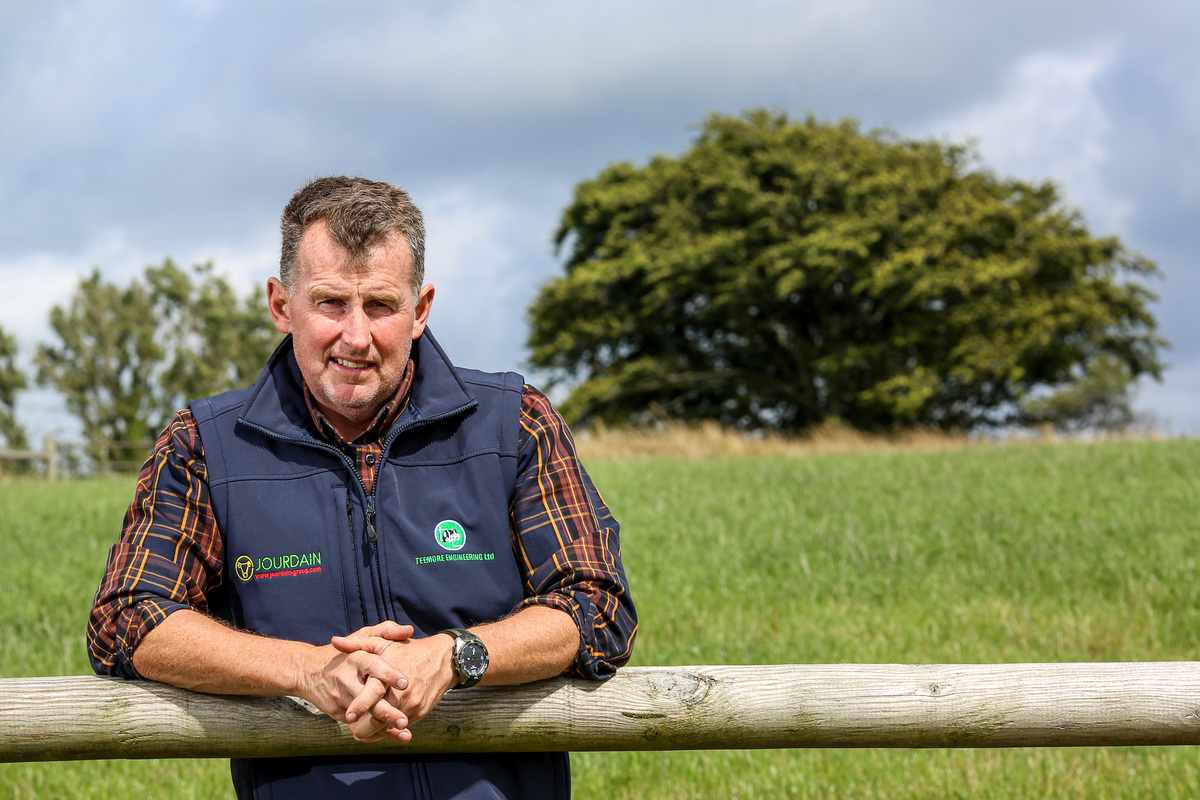Farming Wales reporter Clare Williams went to visit his West Wales farm to find out what made the world-renowned referee hang up his whistle for a quieter life in the countryside...
When it comes to his career choices, Nigel Owens’ passion for refereeing and farming are clear to see. Comparing them both he said: “Farming is a bit like reffing – unless you enjoy it, you just wouldn’t do it. The abuse you get on and off the pitch as a referee and the rising input costs, the low income and challenges such as tree planting and bovine TB in farming, all mean that there has to be something in it that you enjoy, and I wouldn’t change it for the world.”
"If they called me up and asked me to ref the World Cup Final, I’d say no, there’s cows to be calved.”
Nigel Owens
His life on the pitch couldn’t be more different to his life since retiring but it’s one he loves. “I don’t miss refereeing, but that’s probably because I have the farm now. If I didn’t it might be different, but if they called me up and asked me to ref the World Cup Final, I’d say no, there’s cows to be calved,” he laughs.
For Nigel, refereeing wasn’t something he had planned to do, as a child he always wanted to farm. “I was raised on a council estate in Mynyddcerrig but my grandparents had a smallholding, it wasn’t anything big, just a couple of pigs and horses, but I lived there until I was five-years-old. I also helped out at Tyrgarn Farm on a Saturday and then helped my aunty and uncle on their farm, Pentwyn, Llanon, during the school holidays. I started reffing in school and that’s where my love for the job began.”
Early life
After leaving school, Nigel worked on the local Wern Farm, Drefach, before becoming a technician in a local school and a youth worker as part of the Youth Training Scheme. He refereed his first match at the age of 16 between Carmarthenshire and Pembrokeshire in an under 15s clash and he soon became one of the most respected referees in world rugby. His career spanned 17 years, taking control of hundreds of club and international matches, and receiving an MBE in 2016 for services to sport. In December 2020, Nigel announced his retirement from international rugby refereeing after reaching an impressive 100 test games in charge, making him the most capped referee in world rugby history.
“I knew I couldn’t go on forever. Refereeing basically comes in four-year cycles, so in 2019 they wanted me to sign up to another four years and I didn’t want to still be doing it now, in 2023.
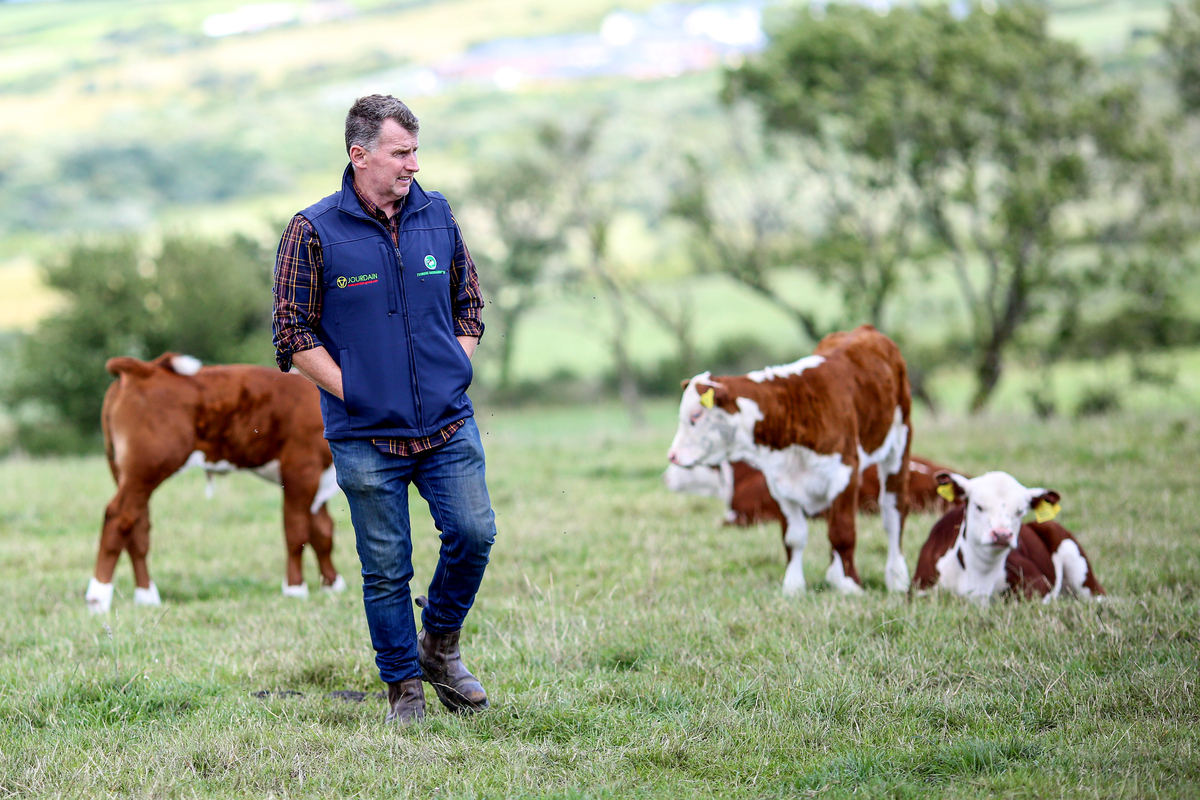
Reaching 100 tests
“I’d got to 98 tests, and I thought the Six Nations game between France and England would be my last match. I spoke to friends and family afterwards and they all said I was only two short of getting to 100 so I should keep going or I’d regret it if I didn’t. My final match was France against Italy in Paris as part of the Autumn Nations Cup in November 2020.”
In 2019, when thoughts of retirement were on the cards, Nigel’s plans to farm came to fruition. “I had always intended to farm at some point. I didn’t think it would be on the scale it is now, but I’d been saving so that when the time was right, I could make it happen. I didn’t want to farm just anywhere, it needed to be in the area. All my friends and family are here, and it came about by chance. We rented 28 acres near home and put a shed up so I could keep a few cows. Then the farm came up for sale, the owners were elderly and passed away and the son wanted to sell as he was a doctor. It’s as if it was meant to be.
“After the World Cup in 2019, we spent ages tidying up the fields, fencing and hedging and getting the place sorted. We now have 60 acres at the farm and another 45 which we rent. The old farmhouse and stable needed knocking down and so we’re rebuilding at the moment and hope to move into the new house before Christmas.”
Diversification plans
Nigel and his partner Barrie Jones-Davies, who works off-farm as a teacher, are already planning on diversifying. “We’re building a holiday let on the yard as well, but we want that to have a bit of a farming theme, and to be educational. When we move up here, I want to have some chickens, so the people on holiday can go and get their eggs fresh for breakfast in the mornings. I think educating people about where their food comes from is really important.”
Nigel has a closed pedigree herd of 75 Pedigree Herefords, under the Mairwen prefix, named after his late mum, Rachel Mairwen. Calving was originally all year round, but he has now tightened this to twice a year. “At the moment we’re calving a small number in December, as it’s usually quiet, and then the main bulk are done in late March. The plan is to tighten this even more and do seven or eight in September and October and then the rest in March and April.”
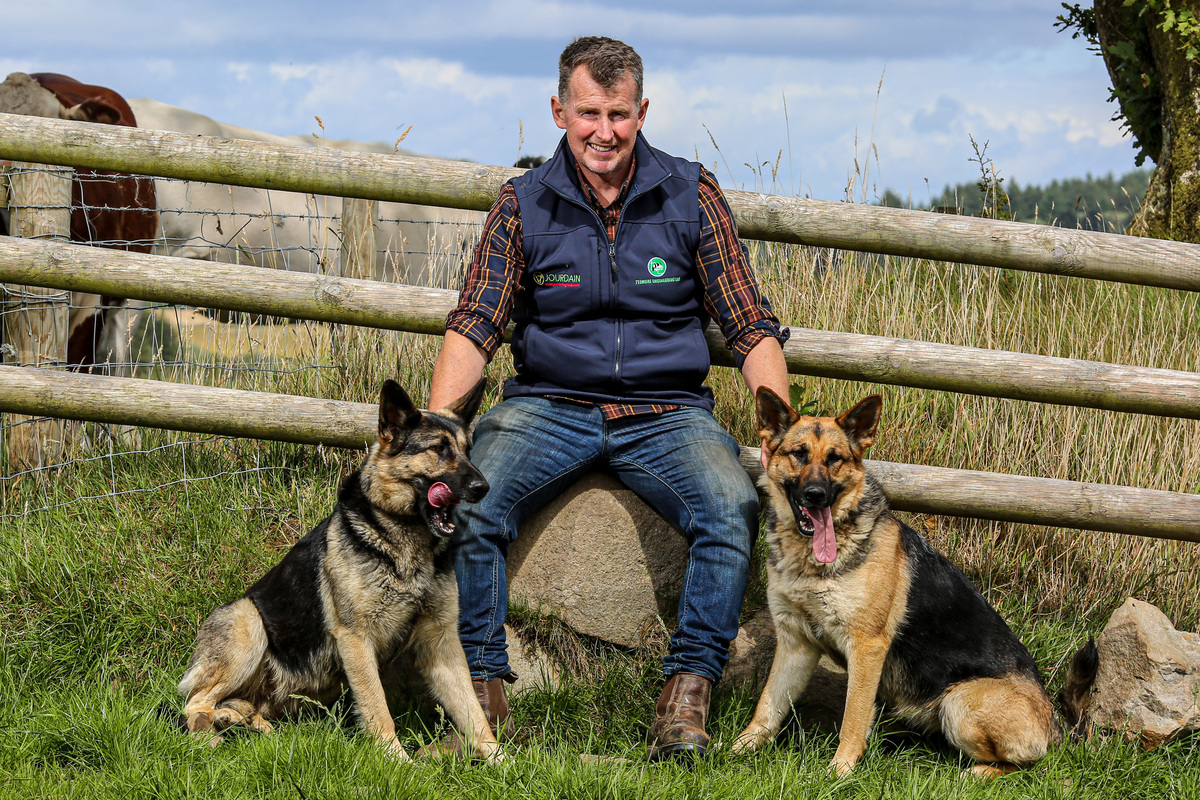
Choosing the breed
When the time came to choose a breed of cows to buy, there was only one choice. “I think the Herefords are a good-looking cow. They’re quiet, docile, easy to manage and they calve without many problems. Working on my own with them most of the time obviously comes with its health and safety risks and this is another reason I chose this breed. I wanted the herd for breeding, rather than for selling as meat, and these do the job for that. I do sell a couple of carcasses a year to The Gourmet Butcher in Cardiff who markets it as meat from my cows, but I’m just concentrating on the breeding.”
A Hereford bull is put in with the cows however Nigel has started using AI to protect the blood lines. “I’ve used AI on a couple of the heifers now as the bull is their dad, but I am hoping to have another young bull here by Christmas to use on his daughters.”
The green, green grass of home
When it comes to feeding, it’s mainly the green, green grass of home. “I don’t want the cows to be in the shed unless they really have to be. I want them to be out in the fields grazing as much as possible. They’re out as early in the spring as they can be, and I don’t put them back in the shed until as late as possible in the winter. They have plenty of grass to eat here as we’re not too far from the coast, so we get plenty of rain.
“They always have a mineral lick in front of them, or mag lick at times, and the calves when they’re weaned around eight or nine months have a bit of feed for the first few weeks, but it’s mainly grass. In the winter months it’s hay or haylage.”
Starting from scratch
For a first-generation farmer, starting from scratch was hard work, but Nigel appreciates he is in a position many youngsters aren’t in. “I am fortunate, I know that. The cows are just starting to pay for themselves, but I am lucky the farm isn’t my main source of income; it’s a hobby I enjoy, but it still needs to pay to remain viable. Young people don’t have the options I had and that’s where council tenancies come in. There needs to be more support for those people wanting to get into farming.
“It is a good way of life. It’s hard don’t get me wrong, but there has got to be a passion there to want to succeed. It’s not a nine to five job, it’s 24/7. I do think there also needs to be a lot more government support for the industry, and for our rural communities. It is farmers who maintain these areas, for the tourists to walk around, who grow the food, who keep the Welsh language going, it’s not the government or the councils. We need the younger members of these communities to want to stay in the area, but to do that they need to have opportunities to be able to work and live here, for the communities to continue to thrive.”
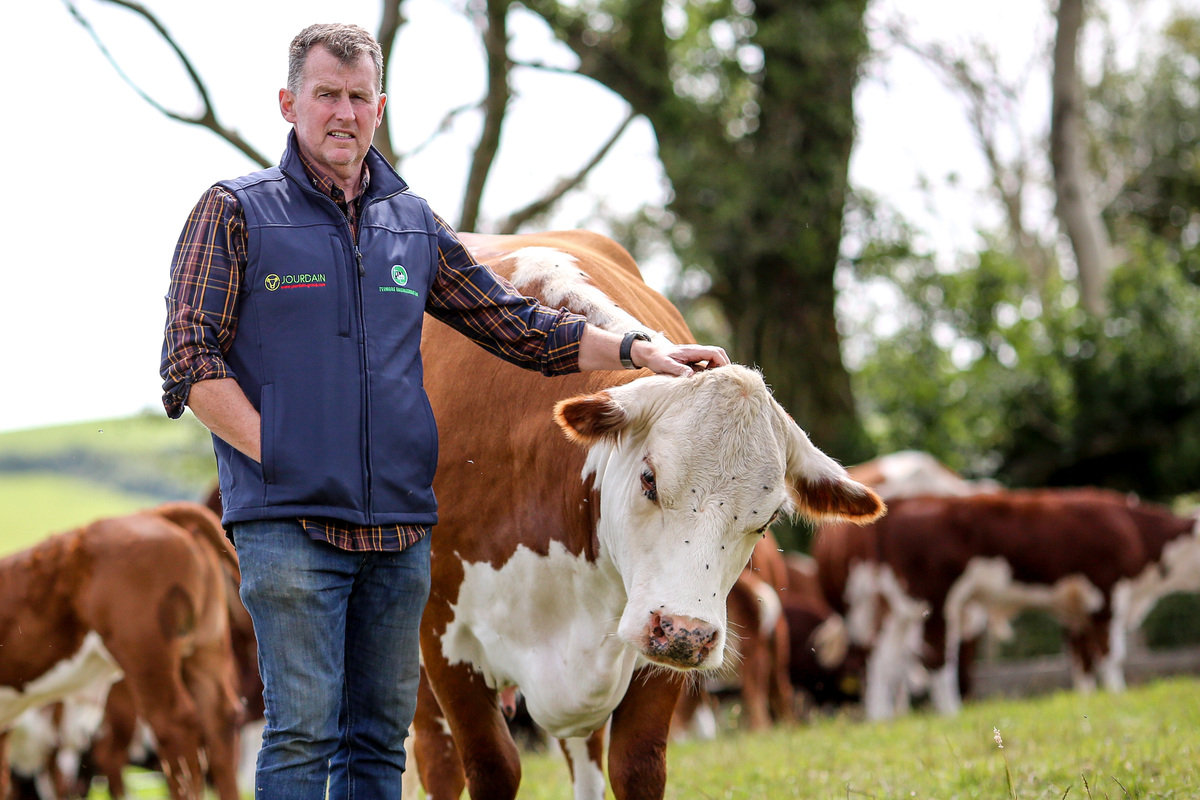
Serious repercussions
Nigel worries that a ‘knee jerk reaction’ to issues happening now could cause serious repercussions in years to come. “When you change the rules or a law in rugby you have to think it through. You have to test it, trial it and make sure it is going to work, before it is imposed on the game. The same applies to farming. If we’re forced to sell out to countries who have less animal welfare standards than we do here, for cheap imports, I think the government will realise in 10 or 20 years’ time what a mistake it was. Let’s hope it’s not too late by then! We shouldn’t be relying on others to provide food; we should be supporting farming and the rural communities to produce food here.
“It’s the same when it comes to carbon offsetting and tree planting. We need trees don’t get me wrong, and we can all do more to limit our impact on the planet, but I think it is wrong that people can come in, buy 140 acres of productive farmland and plant trees to offset their emissions. It’s decimating rural communities and the rules need to be stricter. We can’t just plant trees as we’ll come to regret it.”
Nigel has spent a lot of time refencing and hedging the fields on his farm. “All the fields are double fenced. We’ve planted coppices and hedgerows to increase the biodiversity on the farm as that is where the insects and wildlife thrive. They need hedgerows more than they need trees.
“Everyone at the top of the food chain relies on the little things at the bottom. From the cows to the manure, to the flies. Farmers are responsible for that and if there are no farmers, then there will be a decline in the biodiversity.”
Nigel Owens
“Everyone at the top of the food chain relies on the little things at the bottom. From the cows to the manure, to the flies. Farmers are responsible for that and if there are no farmers, then there will be a decline in the biodiversity.”
Bovine TB threat
Another worry for Nigel is the constant threat of bovine TB. He has been lucky in avoiding the disease so far, but worries that one day it will be ‘his turn’. “We need to do better when it comes to dealing with TB. It seems that Welsh Government is afraid to deal with it. Farmers are being punished and cattle being slaughtered, but we need to be dealing with it in all sources.
“We have a problem with wildlife on some of our other ground, so I don’t keep the cows there, I’m not willing to take the risk, we just use that for haylage. I keep the herd closed to reduce the risk and the mineral licks are kept in containers off the floor, to prevent contamination. It’s enough of a worry for me waiting for the reading of the tests, I can’t imagine the worry or impact on the mental health of those who are at risk of losing whole herds, or those suffering with repeated breakdowns. More needs to be done to tackle this awful disease in all vectors.”
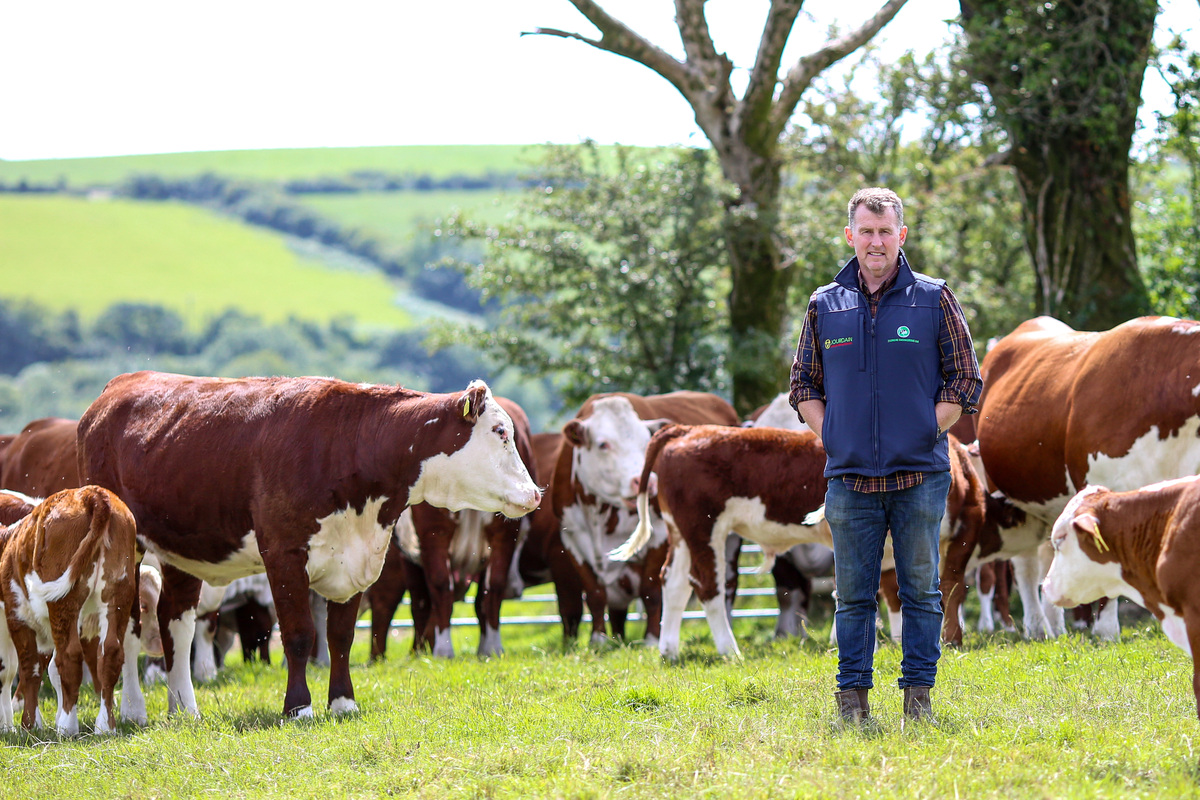
Despite doing most of the farm work himself, when speaking or referee coaching commitments arise, Nigel has the help of his partner Barrie. “He steps in when I’m away, or when there’s cows calving in the middle of the night. My dad, who is 88 and Barrie’s dad who is 73, come up, usually on a Tuesday, and they help with fencing and odd jobs. They love it. I also have Rhys Jones, a young farmer from across the road, who comes and helps if I’m away.”
The difference between a weekend spent refereeing and farming couldn’t be further apart. “I can’t go out late on a Saturday night anymore when there are jobs to do the next day!” laughs Nigel.
Reflecting on his career, Nigel said: “I don’t think I’ve got a favourite team or player to referee, and some teams and players could be challenging. The cows are definitely easier to deal with than rugby players though, they don’t answer back!”
